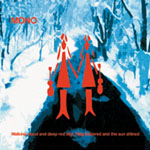|
|
 |
Dusted Reviews
Artist: Mono Album: Walking Cloud and Deep Red Sky, Flag Fluttered and the Sun Shined Label: Temporary Residence Review date: Oct. 7, 2004 |

|
|
|
 |
With their first two albums, Mono, four wiry twentysomethings from Japan, established themselves as masters of a long-form instrumental rock familiar to most - not just post-rock connoisseurs, but frankly anyone who's ever heard a Mogwai or Sonic Youth record. But even if there isn't much novelty in their formula of rising and falling tension, they've always stood apart from the crowd thanks to two things: volume and conviction. Whereas many like-minded groups tend to pile on layers of sound by rote, Mono play with startling expression and feeling - and they also play really, really loud. The relentless towers of guitar-drenched noise they sculpt when in the mood (see "Com(?)," from last year's excellent One Step More and You Die), abrasive and fearsome enough to make Merzbow grimace proudly, more than compensate for the endemic simplicity of their songs' structures.
Mono recorded their third album with Steve Albini - an inspired partnership if ever there was one, for a producer more capable of capturing and enlivening their compelling heaviness is hard to imagine. It comes as a great surprise, then, that Walking Cloud and Deep Red Sky, Flag Fluttered and the Sun Shined, apart from its stereotypical post-rock nonsense of a title, is hardly the record one would have expected. It flexes the volume knob a few times, but never enough to amaze or terrify the listener; gone are the thunderous squall and blistering rubble, in their place patches of distortion that seem tepid by comparison. "Lost Snow," just shorter than "Com(?)" at 15 minutes, builds up the same progression once and then again with a subtle variation of guitar effects, but its volume gradients feel predictable and even awkward at points. Its five minutes of brooding outro would be too much even if not for the laughable bursts of static scattered at random throughout; as it is, the ending almost seems to mock that which seemed so fresh and sincere previously.
Opener "16.12" fares better, building its intensity more smoothly, but it too lacks a certain fervor at its apex, this time more sonic than musical - it doesn't unfold naturally, the production sounds clumsy, and the loud just isn't loud enough. (It's also worth noting that both the song's melody and its structure are curiously similar to Godspeed You! Black Emperor's "Moya," but that part is less troublesome.) The growth itself is still quite pretty, but the ultimate payoff leaves something lacking. The fact that "16.12" and "Lost Snow" are the only two loud songs on Walking Cloud, however, is suggestion enough that playing with the same noisy idiom that worked so well before isn't what the band was after here at all: rather, the rest of the album concentrates on the quieter, more orchestral sound that's always been there but subordinated to the loud parts. It's not that Mono aimed for heavy and missed; they set their sights somewhere slightly different. A waste of studio time with Albini, perhaps, but altogether a respectable career move.
The bad news is that these softer pieces also pale in comparison to precedent. With the exception of the perfectly rendered "Halcyon (Beautiful Days)," perhaps Mono's most gorgeous and idyllic song yet, the rest of Walking Cloud is given to listless and often overlong numbers with little suspense or even trajectory. A string quartet helps matters, and certainly accomplishes the goal of fully realizing the lushness hinted at by songs like "Sabbath" and "Jackie Says" from past albums, but ultimately fails to make up for their lack of direction. Though buoyed nicely by its undercurrent of distortion, "Mere Your Pathetique Light" does the same thing for six and a half minutes.
The disappointments of Walking Cloud are really quite perplexing, given Mono's limited but impressive history and the promise of their collaboration with Albini. Still, if it fails to live up to the heights of One Step More and their debut Under the Pipal Tree, it has its share of moments. As a Mono album it remains thoroughly unspectacular, but if it's the closest record at hand next time the clouds get cinematic, it'll do nicely enough.
By Daniel Levin Becker
|







